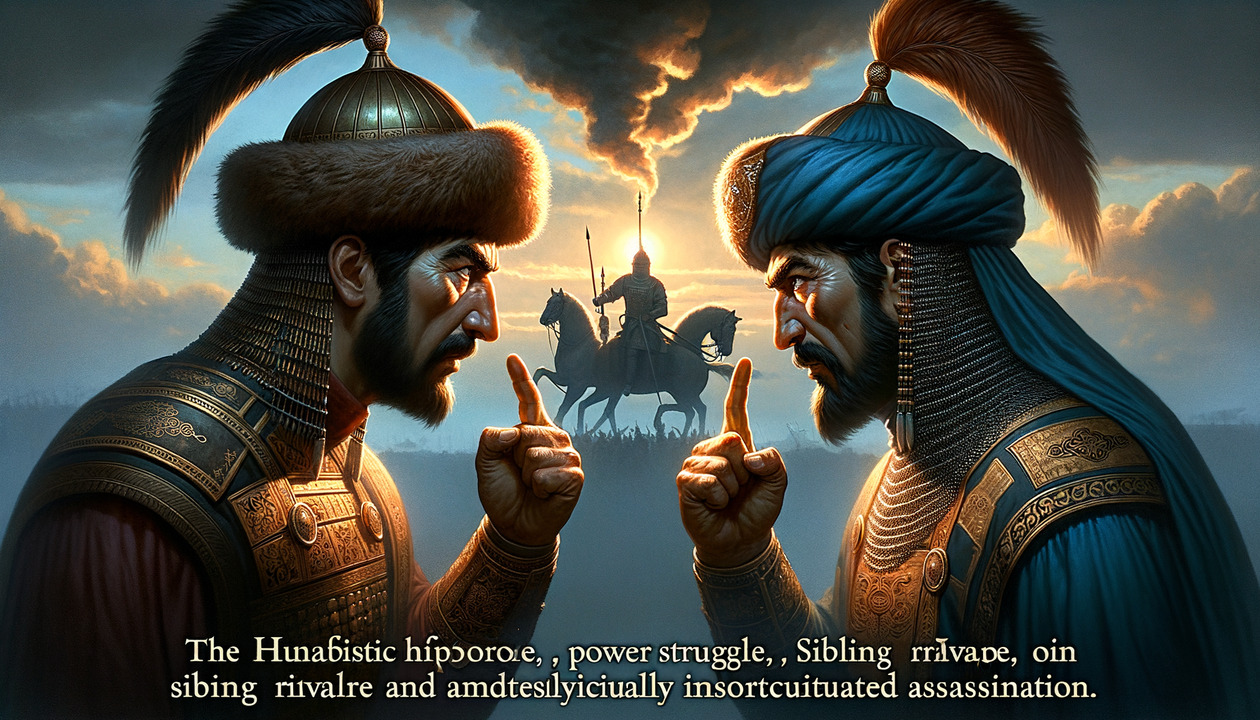
Assassination of Bleda (445 AD)
Attila became the sole ruler after the death of his brother, which some sources suggest was orchestrated by Attila himself. This consolidation of power allowed him to lead unchallenged.
The Mysterious Death of Bleda: A Turning Point in Hunnic History
In the turbulent history of the Huns, the year 445 AD marks a significant turning point with the assassination of Bleda, elder brother of the infamous Attila. This pivotal event not only altered the leadership dynamics within the Hunnic Empire but also set the stage for Attila's rise to unparalleled power. While the actual circumstances surrounding Bleda's death are shrouded in mystery, many historical accounts speculate that it might have been orchestrated by Attila himself—a maneuver that allowed him to become the unchallenged ruler of the Huns.
Bleda and Attila: Brothers and Rivals
Bleda and Attila assumed power of the Hunnic Empire together in 434 AD after the death of their uncle Rugila. Although they were brothers, tensions between Bleda and Attila were not uncommon. As co-rulers, they managed to expand their empire, which stretched from the steppes of Central Asia to the plains of Europe. However, shared power often breeds rivalry, and the leadership of the Hunnic tribes was no exception.
The brothers differed in their leadership styles and visions for the empire. Bleda was known for his more conservative approach, focusing on stabilizing the existing territories. In contrast, Attila's ambitions directed him towards a more aggressive expansion, which sometimes clashed with Bleda's policies.
The Assassination: A Controversial Saga
The historical record regarding Bleda's death is ambiguous, leading to rampant speculation. Some chroniclers, such as Jordanes, suggest that Bleda died under suspicious circumstances that may implicate Attila. The exact nature of his death remains unknown, but the implication is clear: his untimely demise removed the only significant barrier to Attila's dominance of the Hunnic Empire.
If Attila indeed orchestrated the assassination of Bleda, it would not be an unprecedented move in history. Rulers driven by ambition have often resorted to fratricide to consolidate power and eliminate potential threats to their authority. This act, although brutal, allowed Attila to reforge the Hunnic leadership into a singular, powerful fist.
Ascension and Unchallenged Rule
With Bleda's death, Attila assumed total control over the Huns, marking the beginning of one of the most feared reigns in European history. Attila's leadership style was marked by his charismatic and fierce presence, his ability to unify the disparate tribes of the Hunnic Empire, and his relentless military campaigns across Europe.
His reign saw numerous incursions into the Eastern and Western Roman Empires, continually extracting hefty tributes and expanding his influence. Regarded as 'The Scourge of God,' Attila became the embodiment of the barbarian threat to the Roman world. His domination over the Huns was absolute and uncontested, largely because of the power vacuum left by Bleda's mysterious exit.
Legacy of the Assassination
The assassination of Bleda and subsequent rise of Attila had a lasting impact on the history of the Huns and their interactions with other European powers. Attila's consolidation of power enabled him to carry out military strategies that were both devastating and legendary. This period saw the Hunnic Empire reach its zenith, striking fear into the hearts of the contemporaneous civilizations.
The speculation and lore surrounding Bleda's death are testament to the shadowy nature of power transitions in antiquity. Whether or not Attila was directly responsible, Bleda's assassination undeniably paved the way for a new epoch under Attila's dominion. It is a poignant reminder of how fraternal unity, when severed, can lead to dramatic shifts in geopolitics and history.
In examining the enigmatic circumstances of Bleda's death, we gain insight into the complex web of ambition, power, and destiny—a narrative as compelling as any myth or legend. Attila's unrivaled leadership post-Bleda symbolizes both the zenith and the fragility of power built on the foundation of calculated elimination.